Recruitment Read online
Recruitment
The Resistance Trilogy, Book One
K. A. Riley
Copyright © 2018 by K. A. Riley and Travel Duck Press
All rights reserved.
No part of this book may be reproduced in any form or by any electronic or mechanical means, including information storage and retrieval systems, without written permission from the author, except for the use of brief quotations in a book review.
Contents
Prologue
Chapter 1
Chapter 2
Chapter 3
Chapter 4
Chapter 5
Chapter 6
Chapter 7
Chapter 8
Chapter 9
Chapter 10
Chapter 11
Chapter 12
Chapter 13
Chapter 14
Chapter 15
Chapter 16
Chapter 17
Chapter 18
Chapter 19
Chapter 20
Chapter 21
Chapter 22
Chapter 23
Chapter 24
Coming Soon!
Also by K. A. Riley
To Lucy, L.A., Uncle Nephew, and Little Rain for setting me up and bringing me home.
“Whether Tempter sent, or whether tempest tossed thee here ashore,
Desolate yet all undaunted, on this desert land enchanted
On this home by Horror haunted—tell me truly, I implore
Is there—is there balm in Gilead?—tell me—tell me, I implore!”
Quoth the Raven “Nevermore.”
— Edgar Allen Poe, The Raven
“War does not determine who is right—only who is left.”
— Bertrand Russell
Prologue
Everyone knows what happens the day you turn seventeen. But no one knows what happens after that.
Because the day you turn seventeen, the Recruiters come to take you away.
In the Valta, no matter what day or month you were actually born, everyone has the same birthday: November 1st. That’s the anniversary of the day, fourteen years ago, when the Eastern Order invaded our country.
Four years into the war, our little town in the mountains caught fire and our whole world went dark. My memory is hazy, but I’m old enough to remember those first attacks. I was a six-year-old girl when our town burned.
One minute, everyone was living perfectly normal lives. The next minute, a fleet of silver drones—no one knows exactly how many—appeared overhead and fired down a coordinated EMP blast that wiped out our power. In one brilliant flash of photoelectric blue, cell phones stopped working. The wi-fi went down. We lost the television stations, satellite feeds, social media, radio, traffic lights, power outlets, car engines, ham radios, even the flashing lights on the restored carousel in Miner’s Park…everything. One minute, the world was alive with activity and color. The next minute, there was just…nothing.
The adults seemed dazed by it all, like they were walking around in a fog. As if cutting all those signals and wires disconnected something in them, too. But the next day, when word spread of a second swarm of drones on the horizon, the adults were shaken into action. Led by my father, they hustled all the kids in town into the school and got to work hammering big sheets of plywood up against the windows.
The adults saved us.
But by the time they’d finished, it was too late for most of them to save themselves.
The drones rained down a hail of plasma fusion bombs. Buildings burst into flames. The woods at the far end of town were engulfed. The streets and sidewalks melted. People and animals screamed. The cries were so inhuman that I couldn’t tell which sounds were coming from which species.
Somehow, the school survived the attack, so most of us did, too. The adults who were left alive, like my father, did their best to reassure us. They promised us we’d be okay, that help was on its way.
But no help came.
In the aftermath and in my terror, I latched onto my father as he explained how my mother was never coming home. When he said the word “never,” I pressed myself deeper into his shoulder, and I sobbed and screamed until my throat burned. As the days passed, I stared at my father and at my older brother Micah as they cried, too, and as they slowly turned into hollowed-out husks before my eyes. It would be another two years before any trace of life reappeared in their faces. A few years after that, the Recruiters took my brother away. Later that same year, my father disappeared, without a trace or an explanation, in the middle of the night.
After that, I learned to rely on what I had. Instead of friends, I had fellow survivors. Instead of family I had Render, the jet-black raven my father and I raised together and trained. Render became the only living thing in the world I felt connected to.
Otherwise, like my town, I felt alone. Forgotten.
The Valta has always been isolated, but it used to be by choice. The town is tucked away among snowy peaks and has always been hard to access, so we never got too many tourists passing through. The sleepy little town was built on a wooded plateau on the side of a mountain, with impassable summits on three sides and a single steep road snaking down on the other. We liked it that way. We prided ourselves on our inaccessibility.
But after that first wave of attacks, we found ourselves cut off from the world against our will. When the war came to us, the majestic peaks surrounding us on three sides suddenly seemed more like the oppressive walls of a prison.
To add to our natural confinement, the army began to guard us on the fourth side, at the end of the road down at the bottom of our mountain. To this day, no one is allowed to cross, either coming or going. Government orders, they tell us. It’s for your own good.
On the other side of the army’s outpost is a hundred-mile strip of desert wasteland lying between them and whatever they were protecting us from on the other side.
The total government lock-down that occurred ten years ago included buried land mines, motion-detector assault drones, electrified fences, and long coils of razor wire around the perimeter of town. In those early days, whenever we asked, the soldiers told us it was to keep us safe.
I still wonder why being kept safe sometimes feels so unbelievably dangerous.
It wasn’t long before the soldiers stopped their routine patrols and started coming up the road just once a year on what became known as Recruitment Day. And it wasn’t long after that when we realized that the remaining adults in town couldn’t guarantee their own survival, let alone ours.
With so many dead, no connections and no hope, the town’s younger residents did what we had to do: we took over.
We learned to grow food, to make clothing. We learned to fend for ourselves. There were still adults around, but many were either elderly, disabled, injured in the drone strikes, or else too shell-shocked to take care of us the way I know they wanted to. I can’t say I blame them. By most estimates, our town’s population went from about six hundred to less than one hundred in just under forty-eight hours.
Before the strikes, the most crowded place in town was the Farmer’s Market on Main Street.
After the strikes, it was the graveyard.
Word used to go around that there were other towns like ours out there. Contented little prison camps where the government kept people isolated and blissfully ignorant as to what was occurring beyond their borders. We used to get snippets of news from couriers or from the occasional straggler who’d lost their way and somehow made it over the mountain passes to the Valta, trying to get to one place or escape from another.
For a time, we heard tales from the older kids about life out in the rest of the world. Whispers about roving militias. Armed street gangs. Mysterious government training in speci
al facilities in strange little towns that didn’t show up on any map. They told us about those who moved from town to town, taking teenagers away for mysterious reasons.
Now in the Valta, there are exactly twenty broadcast points known as viz-screens posted on crumbling walls or rising up from thin metal poles positioned around what’s left of our town. Those screens are the only tech we’ve been exposed to for the past ten years and the only thing that hints at the possibility that someday the old electronics and energy sources we lost will someday be restored.
From the flickering monitors, the polished reporters known as Casters tell us with beaming smiles and impossibly white teeth about the war we’re winning. Twenty-four hours a day, seven days a week, we hear about the great life that lies ahead for all of us Sixteens after Recruitment Day comes. We hear about the progress made by our side. We see grainy footage of our soldiers marching through the ruins of cities to engage in battle against the Eastern Order.
Other than the soldiers on patrol down at the foot of the mountain, the Casters are our only real connection to life outside the Valta and the only day-to-day confirmation that anyone else is even alive out there.
One year after the attacks, the first of the Recruiters showed up in the Valta. On November 1st, every new seventeen-year-old in town—there were twenty of them that first year—was rounded up and carted off in a convoy of big military trucks to fight for our side against the enemy invaders.
The Recruiters don’t talk much. They don’t tell us where they’re taking the new Seventeens, or what the endgame is. They just show up every year on the same day, square-jawed and armed to the teeth. They used to talk to us more, give us information about the war and about the outside world. Most of the time now, though, they’re cold and silent as stone.
Every November 1st, they return to the Valta to escort the willing. They hunt down and drag away the defiant. Then their transport trucks disappear back down the only road out of town, taking the new Cohort of Seventeens with them.
My name is Kress, and I’m sixteen years old.
This is the last day of October.
My last day in the Valta.
My last day of wondering.
1
“I see your lunatic bird’s showing off again,” Cardyn says, scrunching his eyebrows together as he sidles up to me and stares at Render.
“He does that,” I reply. “He knows he’s the most handsome guy around.”
“Pfft. He wishes.”
The raven who’s been my companion since I was seven years old is parading around on top of the derelict wooden fence that lines one side of the old parking lot where we sleep on nights when it’s too hot in the bombed-out school building we call home. Render is alternating between staring at Cardyn and gawking at his own reflection in a set of wind chimes fashioned out of the jagged pieces of a shattered mirror. Someone decided a few years ago to hang it from the branch of an old tree, and over time, it’s become Render’s favorite distraction on the school’s grounds.
Most of the Valta’s buildings were either demolished in the bombings or are too structurally damaged to live in. But aside from the collapsed northeast corner where a few windows were shattered, Shoshone High School managed to escape most of the mayhem. For those of us who survived, it’s become our home, our meal hall, and the hub of our lives. The building is also our shelter during drone strikes. Though we haven’t had any of those for a while now.
Shoshone High School is where the Sixteens and the older Juvens take on the responsibility of teaching the Neos—that’s what we call the younger kids—how to read, write, garden, hunt, and learn about the world. At first, there were no hierarchies or labels. Over time, though, it made sense to organize ourselves. After the first couple of years of the Recruitment, the older kids established the groupings of Neos, Juvens, and of course, the Sixteens. It made it easier to arrange for teaching and training. Plus, every few years, we got to feel like we were graduating. The system works, which is why we’ve kept it to this day.
Beyond the fence at the far end of the school’s weed-covered parking lot is thick forest, overgrown and untended since the last massive bombing by the Eastern Order a couple of years back. A lot of the trees were hardy enough to survive, but others were scorched beyond recovery. That raid was the worst by far. Fortunately, it was also the last.
Now, instead of being afraid during attacks, we just live in fear of the possibility of being attacked. To be honest, I’m not sure which is worse.
Everyone knows about the Eastern Order, though no one seems to know where they came from or how they managed to invade our country. We’ve been told that in the bigger cities out past the mountains, they plant bombs, target schools, derail trains, and fly airplanes into buildings. People say they’re religious psychotics who believe that some god or other told them to kill anyone who’s not among what they call “the Faithful.” All I know is that they’re the ones who killed my mother and who might even be responsible for the disappearance of my father. For that reason alone, I hate them more than words can say.
The Casters say that for the Eastern Order, killing is a job, some kind of duty or an obligation. The Order casually mows down men, women, and children, all because some deity told them to. All day long on the viz-screens, we see images of the Order marching through burning cities and down bombed-out highways, killing without mercy. The twenty monitors set up throughout the Valta are the only source of restored power we’ve been given by the Execs, the remaining leaders of what used to be the American government.
The good news is that after the last raid, things went quiet. Some said the Order didn’t return because they figured they’d killed us all. In some ways, I felt like they had. My life had changed forever, and so had everyone else’s. Those who survived were left hanging on by a fragile thread, barely able to contain our grief.
In that final attack we lost our supply shed, the water tower, our back-up air-raid shelter, half the woods, and most of the remaining adults. When the smoke cleared, we went from about a hundred people left to just forty. Forty, that is, plus Render. Somehow, he manages to survive everything.
It’s part of the reason he’s so popular in our sad little town. Most of the population of the Valta knows him far better than they know me.
Not to mention that he’s pretty good at pissing my friends off.
“What the heck is he doing now?” Cardyn asks, aggravated and clearly trying to hide a feeling of uneasiness. The raven’s eyes are locked onto Cardyn’s, like he’s competing in a staring contest.
To anyone who doesn’t know him, Render probably looks threatening and unreadable. That’s what happens when the whites of one’s eyes disappear. Darkness takes their place. The eyes go from being windows revealing one’s soul to bottomless pits of pure mystery. Sometimes I wish I had eyes like his. I’d love to be so unapproachable that I could scare off strangers with one menacing look.
Of course, being a five-foot-five, one-hundred-and-twenty-pound teenage girl, I’m the furthest thing from threatening. I’m strong after years of struggling to survive, and sure, I can keep up with some of the other Sixteens when it comes to running or other physical activities. But I’m hardly the athletic star of our Cohort. Whenever I try to appear threatening, Card tells me how I’m more shadow than menace, which usually makes us both laugh.
Cardyn shifts on his feet. “He’s really creeping me out.”
“He’s studying your face,” I tell him with a shrug, eyeing his chestnut-brown eyes and disheveled hair. “He’s memorizing your features. Mapping you.”
“Mapping me? What for? Is he making a note of my gigantic nose?”
I let out a laugh, partly because his nose isn’t even remotely large. I’d never say it out loud, but for me, it’s always been Card’s mouth that stands out. He has almost comically full lips, especially for a guy. Some of the kids used to call him grouper, after the fish. But he never seemed to mind. I’ve heard him call himself worse on a semi-r
egular basis all our lives. Like me, Card’s always known that self-deprecation was the best way to avoid an insult. One time a few years back, he told me his philosophy. “Preemptively tell the world that you suck, and they’ll never accuse you of sucking. At the very worst, they’ll pity you for your suckiness, and that’s way better than having them think you’re arrogant.”
There was a morbid logic to it.
Now that he’s on the verge of adulthood, Card’s grown nicely into his odd-ball features. Pale, freckled skin. Fine reddish hair on his arms. Big hands, callused from helping to build the elaborate pulley and bucket systems we use to move water, haul lumber, and transport unsalvageable materials out to the debris field on the edge of town. It doesn’t surprise me to find out some of the other girls are interested in him. To me, though, he’s still the same friendly, goofy guy I’ve known all my life.
And currently, Render’s fascinated with his features.
“Anyhow, I don’t get why he’d look at me,” Card says. “Everyone knows you’re the prettiest girl in the Valta. He should be staring at you.”
I shoot him a look of shock, only to realize his ears have gone red, like he didn’t really mean to say the words out loud.
“What are you talking about?” I ask him as I feel my own cheeks flush in a sympathetic show of embarrassment. “I’m not even close to being the prettiest. Kella looks like one of those swimsuit models from the old magazines. Rain has perfect skin and hair, not to mention that she’s amazing at everything. I’m just…me.”

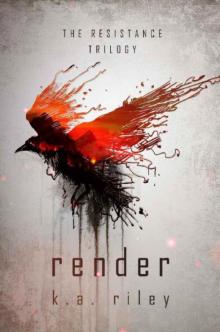 Render
Render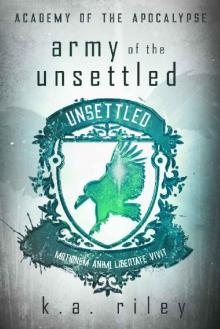 Army of the Unsettled: A Dystopian Novel (Academy of the Apocalypse Book 3)
Army of the Unsettled: A Dystopian Novel (Academy of the Apocalypse Book 3)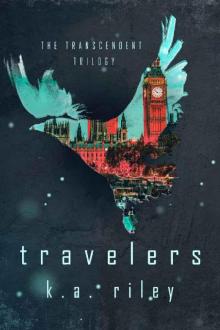 Travelers
Travelers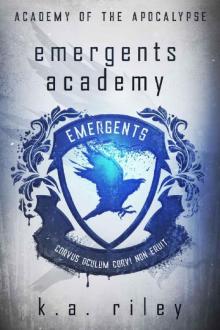 Emergents Academy: A Dystopian Novel (Academy of the Apocalypse Book 1)
Emergents Academy: A Dystopian Novel (Academy of the Apocalypse Book 1)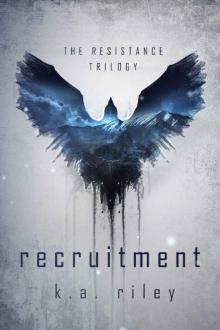 Recruitment
Recruitment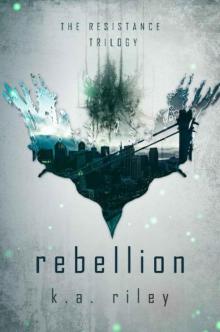 Rebellion
Rebellion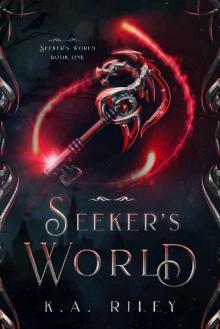 Seeker’s World
Seeker’s World